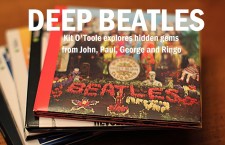“I want to sound as though I’m the Dalai Lama singing from the highest mountaintop. And yet I still want to hear the words I’m singing.”
Imagine working as a recording engineer for the Beatles, arguably the biggest act on the planet, when John Lennon approaches you with that request. How can one possibly understand what Lennon intended for his composition “Tomorrow Never Knows,” much less translate his wishes into a workable solution? Yet Geoff Emerick, the Beatles’ recording engineer on Revolver, Sgt. Pepper’s Lonely Hearts Club Band, Magical Mystery Tour, part of the White Album, and Abbey Road, could creatively translate their ideas into recordings that still sound inventive today.
And the pioneering recording of “Tomorrow Never Knows”? That was Emerick’s first day as engineer for the Beatles.
On October 3, 2018, the music world mourned the loss of Emerick, who died suddenly of an apparent heart attack. In recent years, he had been on the lecture circuit giving presentations on sound engineering, and had been scheduled for several more appearances. Tributes poured in from the Recording Academy, Paul McCartney, Ringo Starr, producer Jack Douglas, and many more titans of the music industry. Thanks to Mark Lewisohn’s book The Complete Beatles Recording Sessions and Emerick’s 2006 autobiography Here, There, and Everywhere: My Life Recording with the Beatles, more fans became aware of the engineer’s important role in the Beatles’ unique sound.
Geoff Emerick began his career at EMI Studios (later known as Abbey Road Studios) when he turned 15; by sheer luck, his second day in his entry-level position involved witnessing the Beatles recording “Love Me Do.” Emerick gradually learned the sound engineering craft from watching Norman Smith, who then worked on the Beatles’ records. By 1966, Smith was promoted; consequently, Emerick was named chief sound engineer and producer George Martin’s right-hand man.
Through his years engineering the Beatles’ albums, Geoff Emerick earned a reputation for his willingness to try anything, even at the risk of getting fired by Abbey Road Studios. When Lennon requested a “nasty” guitar sound for the “Revolution” single, Emerick’s solution was to overload the mic preamp carrying Lennon’s guitar signal. As tape operator Phil McDonald told Lewisohn, “it was technically not the thing to do.” Splicing together two separate takes of “Strawberry Fields Forever” that differed significantly in tempo and key would pose little challenge with today’s computer software, but Emerick achieved the feat using tape machines and varispeed.
When Lennon told Emerick and Martin he wanted to “smell the sawdust on the floor” while listening to “Being for the Benefit of Mr. Kite,” the duo achieved just that by cutting up sound effect tapes and attaching them back together at random. As with the Beatles and Martin, Emerick challenged the conventional wisdom of the time concerning what could be accomplished in the studio. Sound could be altered to fit any mood, tell a story, and impact the listener, and Emerick played a significant part in that development. Through these sound experiments, rock became an art form.
After his time with the Beatles, Geoff Emerick continued working with McCartney, engineering such landmark works at Band on the Run (he won a Grammy for his achievements), London Town, Tug of War, and Flaming Pie. In 1998, he would work with Ringo Starr on the ex-Beatle’s acclaimed solo album Vertical Man. His influence extended beyond the Beatles, however, as he engineered albums by America, Badfinger, Cheap Trick, and Supertramp. A diehard Beatles fan, Elvis Costello tapped Emerick to produce several albums including the universally acclaimed Imperial Bedroom (1982) and All This Useless Beauty (1996).
Perhaps the best way to honor Geoff Emerick is to sit in a quiet place, put on a pair of headphones, close your eyes and simply listen. Listen to how Costello’s voice caresses the microphone on “Almost Blue,” the tinkling of the keyboards on America’s “Tin Man,” or the slight reverb that haunts Badfinger’s “Day After Day.” Smile when hearing the gurgling sounds of the Beatles harmonizing during the middle section of “Octopus’ Garden” or marvel at the throbbing bass on “Taxman.”
As McCartney said in his official statement, “the sounds he managed to conjure up were always special.” The man who specialized in “every sound there is” left a lasting impact on music that will forever be celebrated.
- The Rescued Early Paul McCartney Song That Completed ‘Beatles For Sale’ - December 4, 2024
- A Rare Beatles Cover Proves John Lennon Was Wrong About His Voice - November 26, 2024
- How John Lennon Came Roaring Back on the Beatles’ White Album - November 22, 2023


